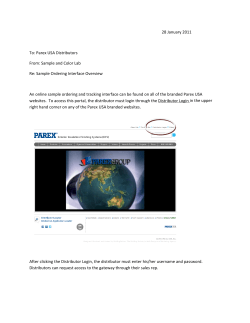
A Quality Agreement, A Supply Agreement â Why Should I Care
87 M O D U L A R A V E N U E , C O M M A C K , N Y 11 72 5 6 3 1 -5 4 3 -3 3 3 4 - 6 3 1 - 5 4 3 - 3 3 3 5 – w w w . g e m in ip h a rm .c o m A Quality Agreement, A Supply Agreement – Why Should I Care About These? By Michael Finamore, CEO, Gemini Pharmaceuticals As a Brand Owner/ Own Label Distributor, your mission is to market and sell your products. Part of that equation is to buy from the Contract Manufacturing Organization (CMO) the highest quality dietary supplements at a competitive price. Historically, the Brand Owner/ Own Label Distributor sends a formula to a CMO, gets a quotation, issues a purchase order, receives the finished product with a Certificate of Analysis (C of A), and then is free to sell the product. A formula, a quote, a purchase order, and a C of A – what other paperwork is needed? Why clutter-up a straight forward process with other documents and paperwork that are not mandated by the FDA? Prior to the implementation of cGMPs for dietary supplements, this was the accepted procedure. Product sales and marketing was the responsibility of the Brand Owner/ Own Label Distributor and making the product was the responsibility of the CMO – case closed. However, times have changed and this is no longer the situation. As mentioned in our previous article, the Brand Owner/ Own Label Distributor can no longer abdicate the responsibility for the quality of their product to the CMO. While 21CFR Part 111 has codified many new and existing practices for the dietary supplement industry, technically there is no requirement for either a Quality Agreement or a Supply Agreement between the Brand Owner/ Own Label Distributor and their chosen CMO. So why is the industry abuzz with everyone talking about these detailed documents? The first step is to understand the unique character of each document, and then recognize how they together form a dynamic foundation for all aspects of a business relationship. The Quality Agreement is a comprehensive written agreement ( usually augmented with a checklist) that defines and establishes the Quality and cGMP obligations of each party involved in the contract manufacturing of dietary supplements.. In general, the Quality Agreement should clarify which responsibilities are assigned to each party per the applicable 87 M O D U L A R A V E N U E , C O M M A C K , N Y 11 72 5 6 3 1 -5 4 3 -3 3 3 4 - 6 3 1 - 5 4 3 - 3 3 3 5 – w w w . g e m in ip h a rm .c o m requirements under 21 CFR Part 111 and per other current industry standards. It will serve as the basis for dispute resolution, audits, and accessibility to product information. For other aspects of the business relationship, a Supply Agreement is the preferred document. In this case, items such as general business terms and conditions, confidentiality, pricing or cost issues, delivery terms, or limits on liability or liquidated damages are addressed. The Supply Agreement helps the supply chain and upper management of both companies in working together, as it removes ambiguity on a whole assortment of issues which might arise over time. For instance, if things don’t go as planned with a certain project or order, the Supply Agreement hopefully will provide a means or a frame work for handling that issue. The partnership can continue working well since the next steps are clearly defined and agreed to in advance by both parties. If constructed properly, it can avoid any conflict between Terms and Conditions of Purchase and Terms and Conditions of Sale, and alleviate the stress of how to handle an unplanned conflict. As was said earlier, Quality Agreements are not required at the present time, but the FDA has offered a Guidance Document for creating a Quality Agreement. http://www.fda.gov/downloads/Drugs/GuidanceComplianceRegulatoryInformation /Guidances/UCM353925.pdf A careful reading of Warning Letters published by the FDA shows that Quality Agreements are becoming a foundational requirement across the industry. While this example is aimed at the pharmaceutical industry, this excerpt is from an FDA Warning Letter issued in 2011 where the FDA stated “……specifically, your firm has not established a quality agreement with the contract manufacturer ……the responsibilities between XXX Company and the contractor have not been clearly defined. Additionally, a similar observation was made regarding your failure to establish a quality agreement with your contract manufacturer of the Again, while not yet required for our industry, historically the FDA produces these documents as an official “look inside” the thinking of the Agency. Prudent dietary supplement businesses should work to design programs in light of these “suggestions” –since the key letter in “cGMP” is the “c” for “current” thinking. drug, ….” While there are a variety of templates available on the web that may be used as the basis of a Quality Agreement, the FDA Guidance Document will help with the fine-tuning of the chosen document and can help clear up ambiguity among related regulatory positions. 87 M O D U L A R A V E N U E , C O M M A C K , N Y 11 72 5 6 3 1 -5 4 3 -3 3 3 4 - 6 3 1 - 5 4 3 - 3 3 3 5 – w w w . g e m in ip h a rm .c o m Within a typical Quality Agreement, there usually will be a series of statements regarding the Quality Systems of both companies, and the document will relate these statements to the various requirements from 21CFR Part 111. Additionally, either in a written or checklist format, after each statement an indication will show which party has the responsibility for completing that task. These requirements can be assigned to either the Brand Owner/ Own Label Distributor, the CMO, or shared among both parties. Since the CMO and the Brand Owner/ Own Label Distributor have to agree to all aspects of the document, both parties are responsible for reviewing and signing the Agreement. Also, the FDA has been known to ask to see the Quality Agreement during an audit to ensure the company does not try to push blame on other parties and answers their questions truthfully and completely. Because these two documents complement each other, the Quality Agreement and Supply Agreement are usually signed in conjunction with each other to give simultaneous coverage of all business issues, However, many examples have combined the agreements into a singular document – although that is not a best practice. If the FDA auditor asks to see the Quality Agreement, you would have to then give the auditor the entire agreement so they can complete their review. Please remember that no Quality or Supply Agreement will absolve the Brand Owner/ Own Label Distributor from their product quality requirement as mandated by 21 CFR Part 111 or from other regulatory responsibilities. The biggest mistake made is when the Brand Owner/ Own Label Distributor attempts to deflect those significant quality obligations to the CMO. Since they still bear the ultimate liability for the product quality, the Brand Owner / Own Label Distributor is still the party responsible for introducing the product into commerce. While not yet specifically required by the FDA, it’s apparent that current industry practices have an expectation of both a Quality Agreement and a Supply Agreement to be present in a manufacturing relationship. This forward-looking practice simply puts in writing the expectations the parties may already have, and also more clearly defines responsibilities, which currently may be misplaced or misunderstood. To both an auditor and the FDA, the presence of these documents demonstrates pro-active thinking and conscious efforts by a company to address responsibilities rather than simply ignoring them - thus giving the FDA that “feel good” impression critical for a successful audit. Although industry has thrived without these documents for years, it is clear that for future growth and 87 M O D U L A R A V E N U E , C O M M A C K , N Y 11 72 5 6 3 1 -5 4 3 -3 3 3 4 - 6 3 1 - 5 4 3 - 3 3 3 5 – w w w . g e m in ip h a rm .c o m sustainability, a Quality Agreement and a Supply Agreement will be necessary documents for successful business relationship.
© Copyright 2025









